L'Acadie Vineyards Blog
Welcome to the L'Acadie Vineyards blog and winery news
Receive a Winery Tasting Voucher for Two to Celebrate 2020 Tidal Bay Launch
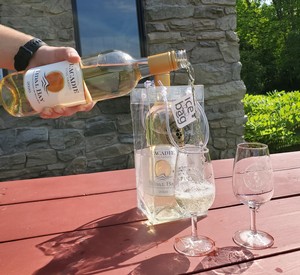
We are celebrating the launch of 2020 Tidal Bay from wineries in Nova Scotia with fun offers from Wine Growers of Nova Scotia! Purchase 6 bottles of our organic wine including at least one bottle of Tidal Bay before the end of June from our website for shipping or curbside pickup to get the following offers,
- Receive a voucher for a wine tasting experience for two at our Gaspereau winery. We hope to be opening for tastings in late June in Phase Two of Nova Scotia`s Reopening Plan and our employees have been vaccinated for at least two weeks.
- Also receive a Wine Growers of Nova Scotia Ice Bag with shipped orders or two branded wine glasses with curbside pickup orders. While supplies last.
- Free Shipping for 6 bottles or more in Canada until end of June
- Mark your calendars for Live Tidal Bay Tastings and listen to winemaker Bruce Ewert on June 18
A new Sparkling Style
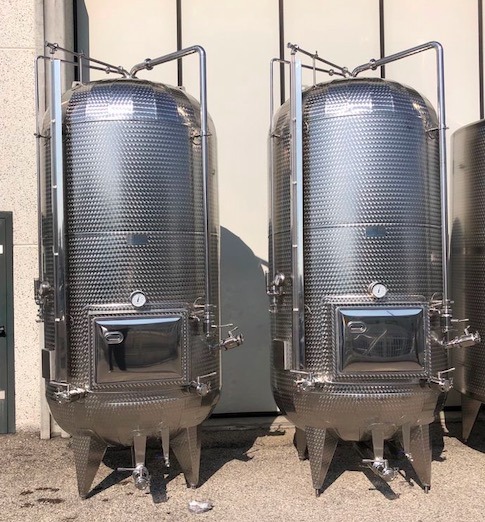
We are excited to announce that we will be releasing Joie de Vivre, a new sparkling style this summer - Charmat Method! The second fermentation will occur in specialized pressure tanks instead of traditional method sparkling bottles to produce natural bubbles the same way that Prosecco is made.
Joie de Vivre: noun [zwahduh vee-vruh] joy of living; a delight in being alive. We can all use more Joie de Vivre moments in our life and this wine embodies that philosophy, at a price that encourages more life enjoying moments!
This ambitious project has been three years in the making and answers calls from Nova Scotia restaurants, NSLC and other wine trade for a fresh early-release sparkling. Charmat method sparkling wine has a relatively brief time in tank to complete second fermentation and to keep wine fresh and fruity, compared to traditional methods of aging in bottle on its yeast lees for 2+ years. Fresh, creamy persistent natural bubbles and certified organic.
“Charmat method” will be the declared production method on front labels and assures you that it is not produced by artificial carbonation like many wines on our market. It complements our diverse Traditional Method sparkling portfolio and offers a new sparkling that is fresh, vibrant, fruity, and dry.
Charmat tanks are very specialized and our tanks are presently being shipped from the heart of the Prosecco region in Veneto, Italy, where Prosecco charmat production is famous.The project was delayed with the pandemic in hard hit northern Italy but we are thankful for their extra efforts. This specialized sparkling style requires experience and expertise, and winemaker Bruce Ewert worked with the style in Ontario early in his career.
Expected release of Joie de Vivre is June, in time for your barbecues, outdoor living and restaurant patio sipping.
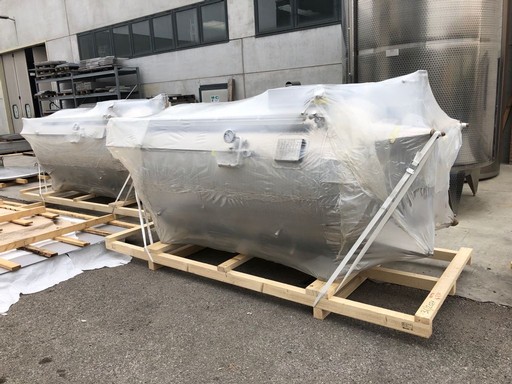
Which Annapolis Valley Wine Tours Will You be Taking in 2021?
There are high hopes that the 2021 tourist season will be better than 2020. Will we have the famous Atlantic Bubble again or will it be mainly staycations within the province? We don’t know, but we are planning on optimism and have many compelling reasons for you to visit our Gaspereau winery this year.
Wine tours of wineries in Nova Scotia are very popular. We are a family run organic vineyard in Gaspereau Valley and our Wolfville winery offers wine tastings, vineyard tours and even encourages visitors to bring their own picnic for food and wine pairings. We are the birthplace of traditional method sparkling wine and offer one of the most diverse sparkling wine portfolios of all the Nova Scotia vineyards and the most organic wine. Visit our wineshop and bring a bottle home to relive your day in the heart of wine country.
Wine Tasting and Tour Options – Season starts late May (date to be announced)
All tastings and tours are by appointment, Visit our website to book your tasting now: /Visit-Us
Sparkling Tasting – Four of our sparkling wines including wineshop exclusives, production methods and suggested food pairings
L’Acadie Tasting – an exploration of our diverse organic wines with three still wines and a choice of traditional method sparkling wine
A la Carte Tasting – you decide which wines that you would like to taste
Vineyard Tour – taste three focussed terroir wines while learning about our vineyard practices, organic ethos, terroir and sense of place.
Learn more about our tours and tastings on our website.
Industry partnerships are a valued component to our wine tour program and we are pleased to work with five tour companies in 2021. They also offer custom winery tours in the Wolfville area, so just ask them to include us and they will!
The Case for Cork
We have used cork closures for our organic wines since we established our Wolfville winery L'Acadie Vineyards in Gaspereau Valley. They fit our organic ethos of natural, sustainably harvested and recyclable. They also provide a small measured dose of oxygen to cellared bottles for ideal aging, and our library releases of 10 year old sparklings and whites have reflected that care, rewarding our customers with complexities and unique experiences. But there has always been the spectre of possible cork taint caused by a chemical produced by natural cork microbes, TCA (trichloroanisole). Cork taint affects about 2-3% of bottled wine on average according to Wine Folly, lower if you purchase high end corks like we do, but new technologies are lowering that number even more for TCA free wines.
Our cork supplier, Amorim Cork, revealed their new anti-TCA technologies early this year and we couldn't be more excited. They produce about half of all the corks in the world and have introduced thermal, pressure and carbon dioxide processes in parallel with effective screening to claim that their TCA levels are less than the sensory threshold of 0.5 nanograms per litre (ng/l) wine. In fact the production batch being shipped to us now has been tested at 0.05 ng/l !! This is good news for us and our customers as we start another bottling season and prepare to disgorge a special 10-year tiraged sparkling for our wine club members.
Watch this video shared by #TastingClimateChange on the regenerative aspects of corks, Amorim Cork, a sustainable option
Wines not intended for aging theoretically do not need a natural cork for their evolution. We have decided to use screwcaps this year for Rose and our first release of Tidal Bay. Several considerations went into this decision and our first most important question was answered with approval from our certified organic inspector. These are early-release Nova Scotia wines and Rose has been selling out every year and we expect Tidal Bay to be as popular. We are joining a family of Tidal Bays from other wineries in Nova Scotia and most are using screwcaps for ease of opening and re-sealing between sips.
Tidal Bay - our approach
We are releasing our first Tidal Bay in May! Joining a legacy of almost 10 years of previous releases from our Nova Scotia vineyard friends. And we couldn't be more excited about our inaugural blend and new label. If you're a lover of wineries in Nova Scotia you know what I'm talking about, if not, here is a Tidal Bay primer on the Wines of NS website
Why have we not joined the bandwagen in the past? We were not members of the winery association for the past seven years and Tidal Bay is an association initiative. We left the association because of issues with other winery board members in their refusal to protect our region's traditional method sparkling wine image from the growing number of artificially carbonated wines. We wanted better wine standards, they didn't. There are now new government-led wine standards being developed that will protect the image of sparkling wine, resulting largely from our lobbying.
We have built our winemaking reputation on sparkling wine with the first releases for the province and many international awards and accolades. Prestige Brut Estate was even shipped to the embassy in Moscow recently...for the second time! We are a winery that didn't set out to be everything to everybody. But we have been quietly researching and experimenting new styles beyond sparkling, always with the ethos of sustainability and suitability to our climate. Releases that have reflected those efforts are appassimento reds (Passito) and dessert wines, carbonic maceration red, and wines fermented with wild yeasts such as Pet Nat and Orange wine. And we have been doing the same meticulous planning and trial ferments for our new Tidal Bay program.
Our approach - dry and organic. To make sparkling wine you first have to be talented with making base wines that have a sense of place. Our many years of releases of Estate L'Acadie and Prestige Brut Estate show my winemaking style of showcasing our terroir - dry and clear. We planted predominantly L'Acadie blanc on our estate because we were impressed early with its flavours on our many investigative trips to Nova Scotia, Pauline's home province, and saw the potential of matching the unique gravelly terroir of our Gaspereau vineyard with Nova Scotia's signature variety. In fact, enhanced minerality and slight saline from schist, sandstone, an ancient seabed, is our own terroir signature, and getting stronger each year as the roots reach deep, over a metre presently. We approach Tidal Bay with the same lens - dry and the blend is predominantly L'Acadie from our estate.
Organic viticulture has been practiced at our Wolfville winery since inception and our Tidal Bay is a certified organic wine. The blend also has 15% organic Seyval blanc from the Windsor area on typical heavier soils- clay, loam. We are familiar with it from years of blending with Vintage Cuvee and it brings acidity and citrus flavour to the blend, fully complementing the richer tropical notes from L'Acadie. Living soils are prominent in both vineyards, a foundation of organics, with fungal populations helping the vine accentuate its uptake of not only nutrients but also flavours from the soil. A perfect match for a terroir-based wine like our Tidal Bay.
Releasing May 1 on our website and later in May in our wineshop.
UPDATE: As of May 1 you can buy Tidal Bay here
Is Wine Vegan?
Is wine vegan? Yes, all L'Acadie Vineyards wines are vegan and organic, and we also follow vegan viticulture. So what can makes other wines not vegan? We all know that wine is grown in the vineyard, that practices and weather can play a significant role in ultimate wine quality. So let's start there.
Vineyard management varies depending on varieties, vineyard location and philosophy. Our location is deeply rooted in Gaspereau, Nova Scotia and we grow several varieties - L'Acadie blanc, Leon Millot, Chardonnay, Sauvignon Blanc and Pinot Noir. Click here for more about our terroir. The latter varieties are in the vinifera family and are more sensitive to disease so require more attention. Strategies include hilling the trunks in winter, leaf removal next to clusters and shoot positioning for air circulation, periodic sulfur applications on the leaves and plant residue teas. That brings us to philosophy, which really has two camps - conventional and organic. We have been organic since first planting our estate in 2005/2006 and our nutrient management includes beet extracts for a nitrogen source rather than animal manure. Synthetic inputs are not allowed in organic systems and these include petroleum-based fertilizers, glyphosate weed killer, and a host of systemic and contact pesticides that ultimately make it into your wine.
Winemaking is the more direct source for non-vegan inputs. The most prevalent is gelatin, derived from animal slaughtering. It is a protein fining agent that is routinely added to hard press juices to reduce the bitter tannins that were squeezed from the skins. And there are other proteins used to similarly reduce bitterness and astringency in wines - egg whites for barrel aged reds, casein (cow milk) for correcting oxidized wine, and isinglass from fish bladders. So what do we use? Bentonite is a clay that has amazing clarification and stabilization benefits, and a riddling aid to help the yeast slide down the bottle for traditional method sparkling. For tannin management, we only make reds when the season gives us ripe tannins and phenolics(don't bother looking for 2018 and 2019 vintages), and after careful maceration techniques and aging in barrels we don't need to reduce astringency.
Organic winemaking is low intervention. And as Heather Rankin at Obladee Wine bar in Halifax said it once, "You have to know a lot to do a little". So very little inputs and essentially nudging the wine along its evolution path to become what it was meant to be in the vineyard, a wine with soul and transparency. Organic certifiers audit our grape sources and all our inputs, and the Canada Organic logo on our bottles is your assurance.
Join our organic wine clubs! Click here for more information
Top 2021 Wine Trends
Top 2021 Wine Trends compiled by Natural Merchants - Family Produced Organic Wines
Timely article by Natural Merchants that points to many aspects of our own wine portfolio. I never thought I'd be saying that we are trendy, we've been at this too long to suggest we are bandwagon jumpers, but our wines check the boxes on many of the trends mentioned:
- "Sparkling wine, and Prosecco in particular, has spearheaded the diversification of wine’s consumption occasions. The category has steadily moved away from its one-dimensional image as a special celebratory drink to align with more regular occasions, such as the aperitivo hour."
- “As a result of the pandemic, the importance of sustainability has been reinforced in the minds of consumers. In tandem with increasing the focus on environmental concerns, the pandemic has amplified the trend towards health and wellness. Together, these issues have acted as major drivers of the organic, biodynamic, and low-intervention wine movement.”
- Bio-hacking: "In the wine world, this refers to wines that are low in sugar and alcohol that can be incorporated without dire effects into a diet such as Paleo or Keto. The wines have low-enough sugar (under 1 g/l) and alcohol to keep the body from going out of Ketosis, when consumed in moderation." ~Nova Scotia wines are naturally lower alcohol, and we don't add sugar to sweeten our still wines - all are under 1 g/l
- "Online sales will continue to boom, up for small wineries by 154% in 2020." ~We launched our new online store in August 2020!
- “To put it simply, rosé has exploded in popularity in the last few years, but it also has a lot more versatility and seasonal range than most people realize,” ~ Check our rose wine lineup - Rose, Vintage Cuvee Rose, Sparkling Rose, Rose Brut.
Sipping Stars
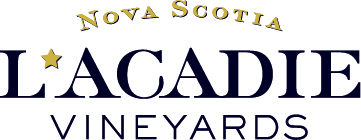
Have you ever imagined that those playful bubbles in your glass of sparkling wine are like stars? Dom Perignon thought so too. He was the blind French monk that is credited with the discovery of fermenting wine in the bottle and was quoted as saying, "I'm sipping stars!". And they have been the iconic symbol of Champagne ever since, including sparkling wines from other regions.
We associate stars with our sparklings based on these traditions. And our relationship with the style is strong: an experienced sparkling winemaker from British Columbia, the first release of traditional method sparkling in Nova Scotia and the province's first international awards. We were honoured when Beppi Crosariol wrote in the Globe and Mail, “Bruce Ewert released Nova Scotia’s first Champagne-method sparkling wine back in 2008. The local industry owes much to his foresight” Our present logo boasts one proud star, and our first logo back in 2008 had five stars. 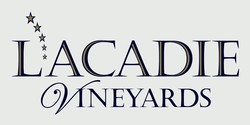
You'll recognize this logo on our road sign at the winery as a continuing homage to sparkling wine and our commitment to its craft in Nova Scotia.
Vintage 2020 - Hot, Dry and a Shining Star
Ferments are finishing and vintage is winding down, making this a good time to review vintage through a winemaker’s lens. Vintage 2020 was a shining star in contrast to the dismal pandemic backdrop, and Nova Scotia winemakers needed it after the 2018 June frost and very cool 2019 season. A mild winter and record heat units in 2020 made it a growing season to remember, the most grapes we have had from the Estate. Many days shattered the 30C window and it was dry, but with enough well-timed rain for our established blocks of L’Acadie and Leon Millot. These 10 year old vines have worked hard over the years to extend their roots metres deep in well drained gravels of schist and sandstone, depths that show fair resistance to drought conditions. In contrast, new blocks of two year old Chardonnay, Sauvignon blanc and Pinot Noir needed irrigation almost every two weeks.
We pruned sparkling blocks to 20-24 buds/vine last winter and yields were 8 tonnes/hectare…if you are comparing us to Champagne (which we happily encourage) their yields are up to 10 tonnes/ha. A hurricane forecast jump started harvest on September 17 but luckily we were not affected, and we continued the sparkling pick for four weeks with an awesome group of local pickers, many that have been with us since the beginning. During that time acids only decreased minimally in true Nova Scotia fashion and the happy result is that we have many tanks of diverse sparkling bases to create our sparkling blends – some with steely acidity, some richer with more of a citrus direction. As always, seeds were brown and lignified, physiologically ripe, and bragging rights to other sparkling wine regions We pruned other blocks for Estate L’Acadie and picked ripe golden sun exposed grapes before Thanksgiving and either crushed for skin contact, or pressed whole cluster for a Tidal Bay blend, our first! The blend will be about 15% Seyval from one of our growers in Falmouth on heavier soils. Appassimento techniques for a small amount of red continue in the cellar and we expect to finish pressing this week. Yields were low in the Leon Millot block and birds outsmarted our netting - wish we had more. Be prepared to be wowed with Nova Scotia 2020 reds, released in a couple of years. It was a pleasure to have an intern from the NSCC Cool Climate Wine and Viticulture program with us for vintage -she helped with small lots, did most of the lab work and press loading and emptying. Very passionate about wine and a keen learner...expect to see more of her in our industry in the future.
Vineyard activities will continue into December with Caitlin busy rock picking and hilling the lower blocks, turning the soil under the L’Acadie and starting to prune. You might have noticed us renewing our cover crop if you visited this year. Timothy was chosen for its shallow roots and compatibility, and we will continue planting it every other row in the spring. Organic principles are to avoid bare soil for extended periods and cover crops are significant. Vegan agriculture is a part of our organic ethos and excludes all commercial livestock, harming of animals and inputs of animal origin. Stay tuned for more blogs about that!
